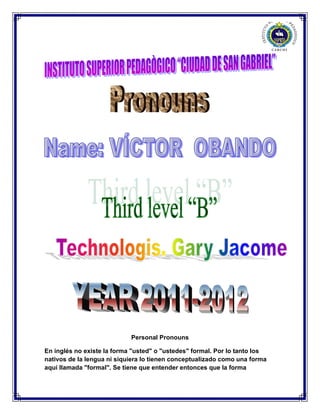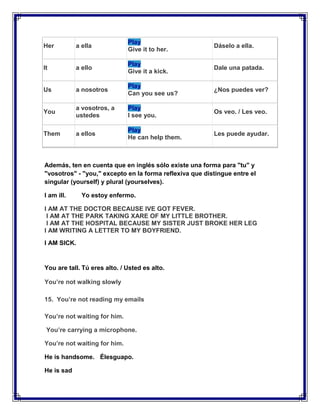Este documento describe los pronombres personales y posesivos en inglés. Explica que en inglés sólo existe una forma para "tú" y "vosotros", "you", y que los pronombres personales varían por género pero no por formalidad. También presenta ejemplos de uso de los pronombres personales y posesivos en oraciones.





![He is going to the party with us. (Esta yendo a la fiesta con nosotros.)
he is going to party with us.
he is going to travel with us
he is going to run with us
he is going to believe us.
he is going to the hospital with us.
he is going to the garden with us.
It is [the letter] for you. (Es [la carta] para ti.)
It is the letter for you.
It is the note for you.
It is the poetry for you.
It is the versefor you.
It is the Lyricsfor you.
PossessivePronouns
Los pronombres posesivos varían según el que posee y no según la
cantidad poseida:
my book, your book, his book, our book, my books, your books, his books...
PossessivePronouns (Pronombres posesivos)
Pronombres posesivos
Traducción
(en función de determinante Ejemplo
ejemplo
del sujeto)
My mi, mis Thisis my house. Ésta es mi casa.
Éste es tu libro.
tu, tus (de tú) /
Your Thisis your book. / Éste es su
su, sus (de usted)
libro.
Ésta es su
His su, sus (de él) Thisis his bicycle.
bicicleta.](https://image.slidesharecdn.com/misaelingles-111121021439-phpapp02/85/Misael-ingles-6-320.jpg)

![His car is red
His ball is blue
His Paper is green
His table is coffee
His computer is black
My houseissmall. (Mi casa es pequeño.)
My dog is big
my bike is medium
My ball is red
My book is beautiful
my dictionary is fun
En función de pronombre:
Gramaticalmente funciona como un pronombre en función de complemento
directo. Siempre va al final de la oración.
El genitivo "-s" no se ha de confundir con los pronombres posesivos. Así
podemos decir:
Her dress... (Su vestido...[de ella])
O podemos decir:
Andrea's dress... (El vestido de Andrea...)
En ambos casos expresamos un poseedor y un poseído, en este caso el
vestido. En la primera frase, el pronombre posesivo femenino "her" indica
que tanto el hablante como el oyente acaban de hacer referencia a la misma
persona. En cambio en el segundo caso, el hablante quiere dar a conocer el
nombre del poseedor.
Siempre utilizamos el genitivo para referirnos a personas:
Paul's house... (La casa de Paul...)
Mary's bike... (La bicicleta de Maria...)
Cuando nos referimos a cosas o lugares utilizaremos la preposición "of":](https://image.slidesharecdn.com/misaelingles-111121021439-phpapp02/85/Misael-ingles-8-320.jpg)









